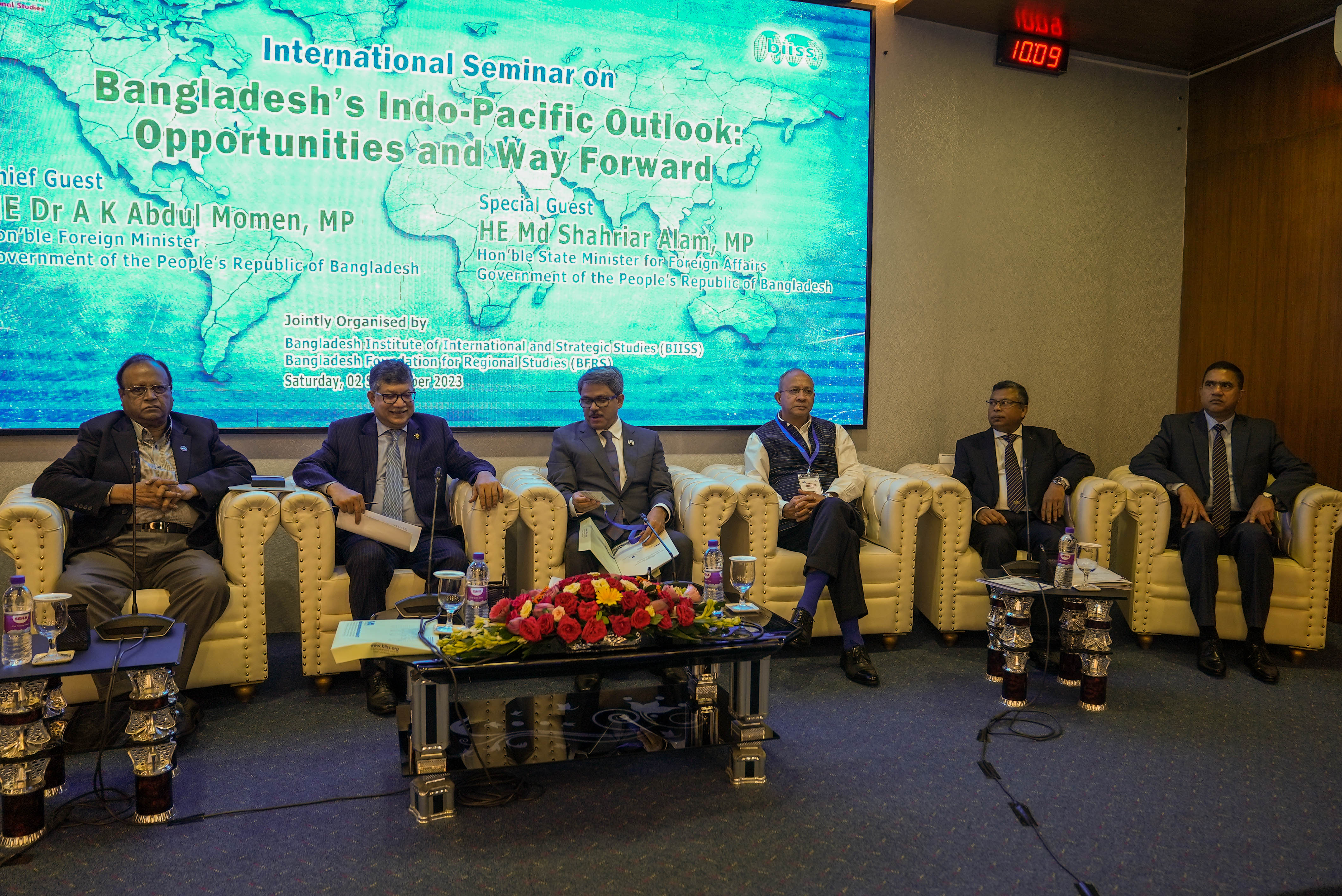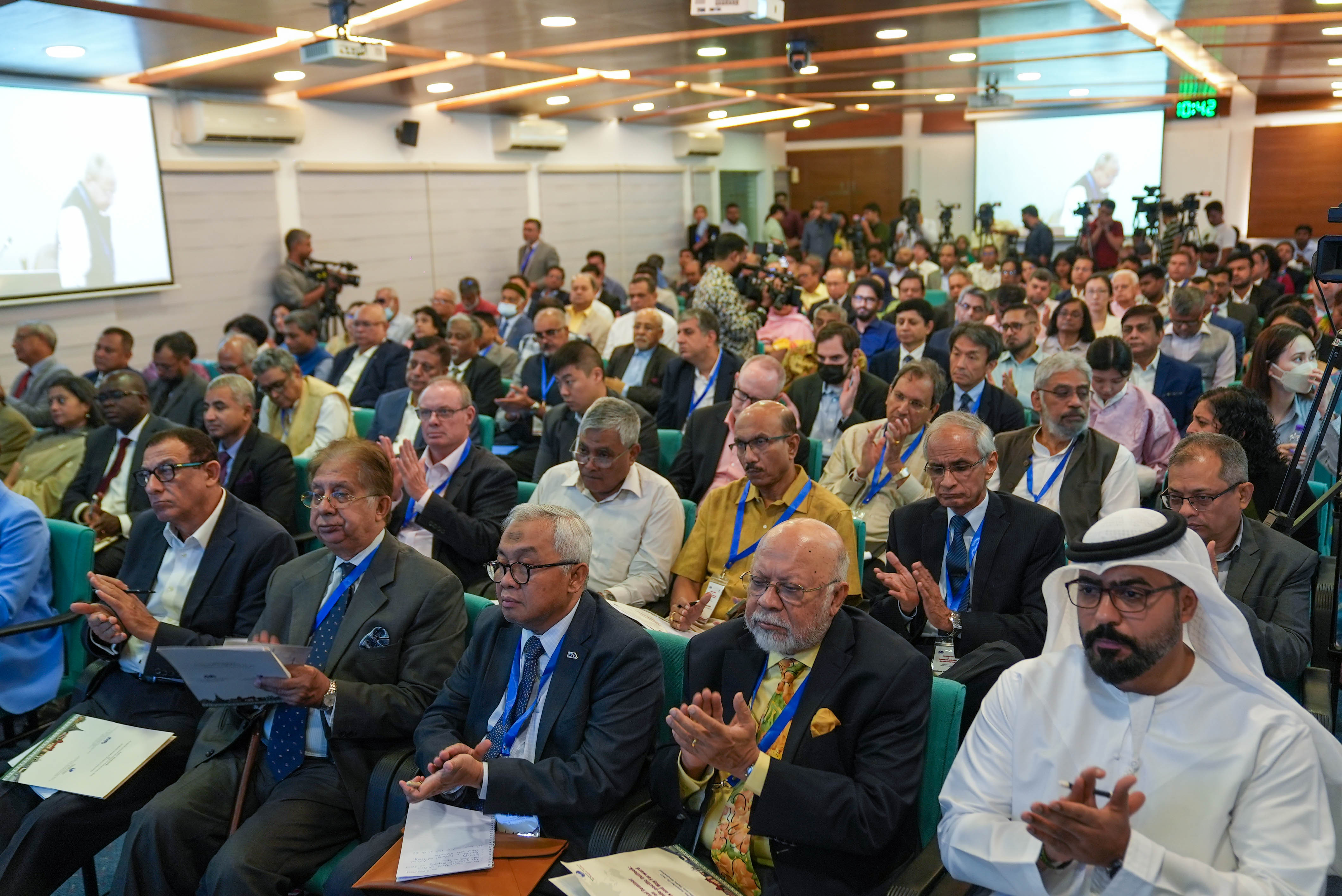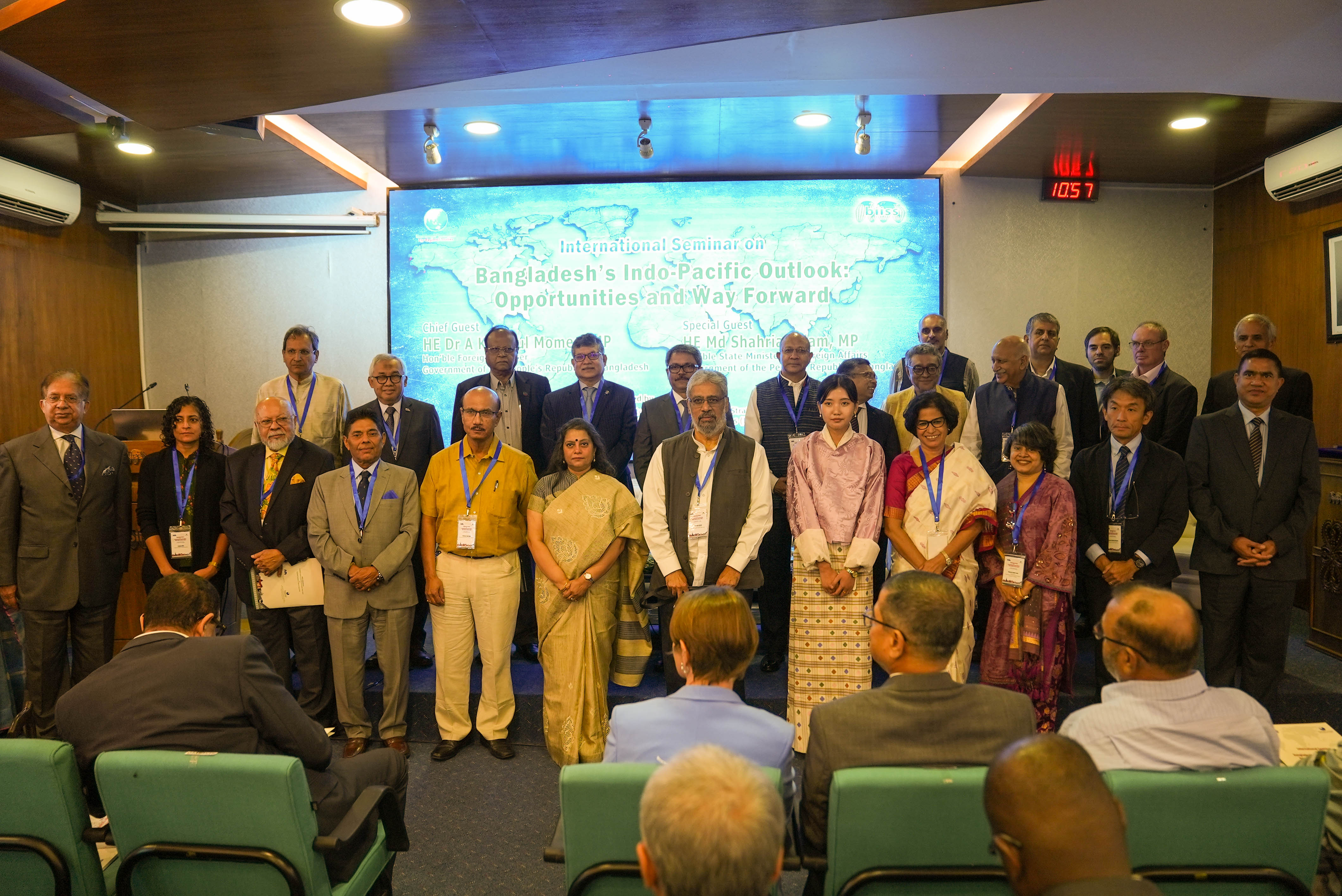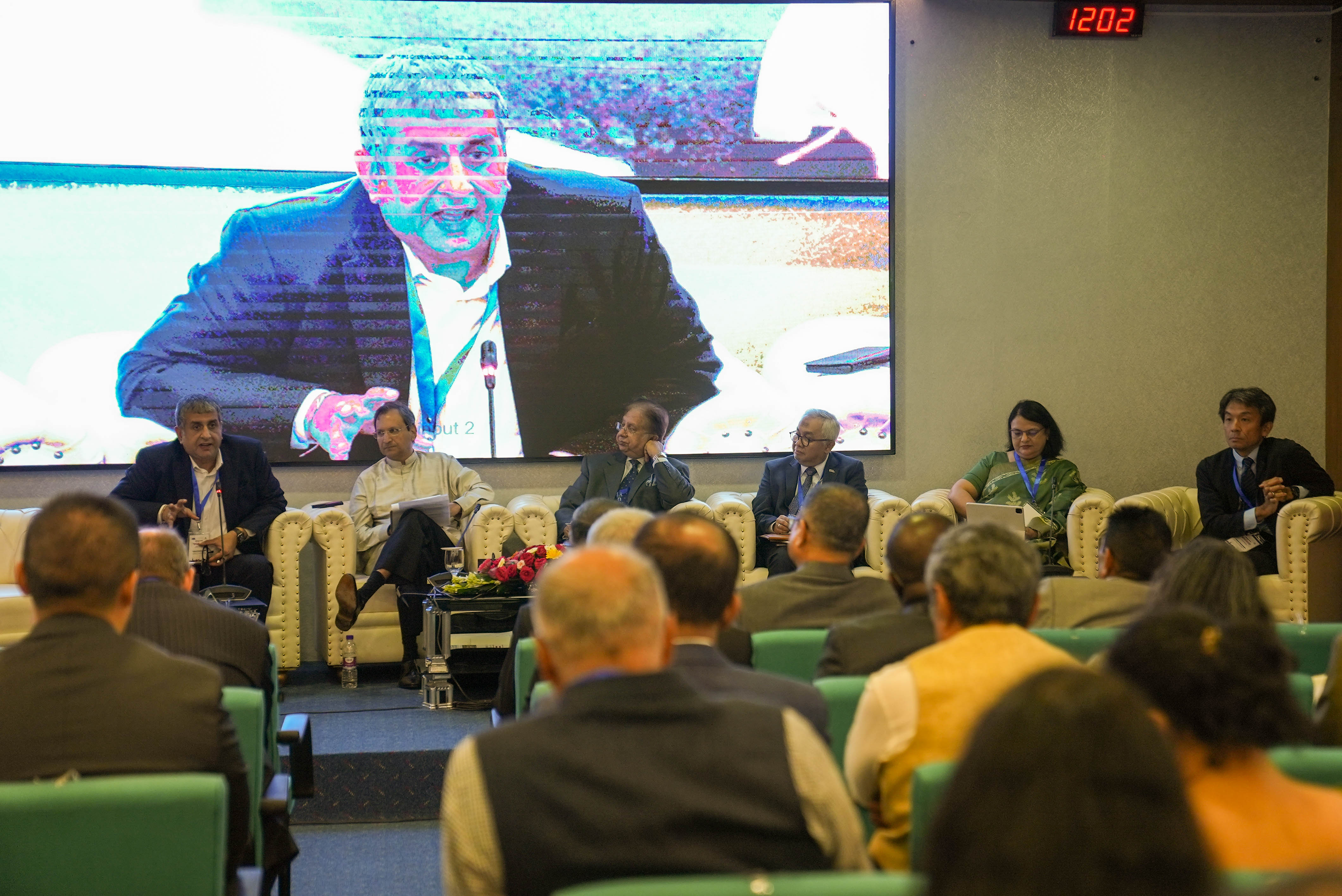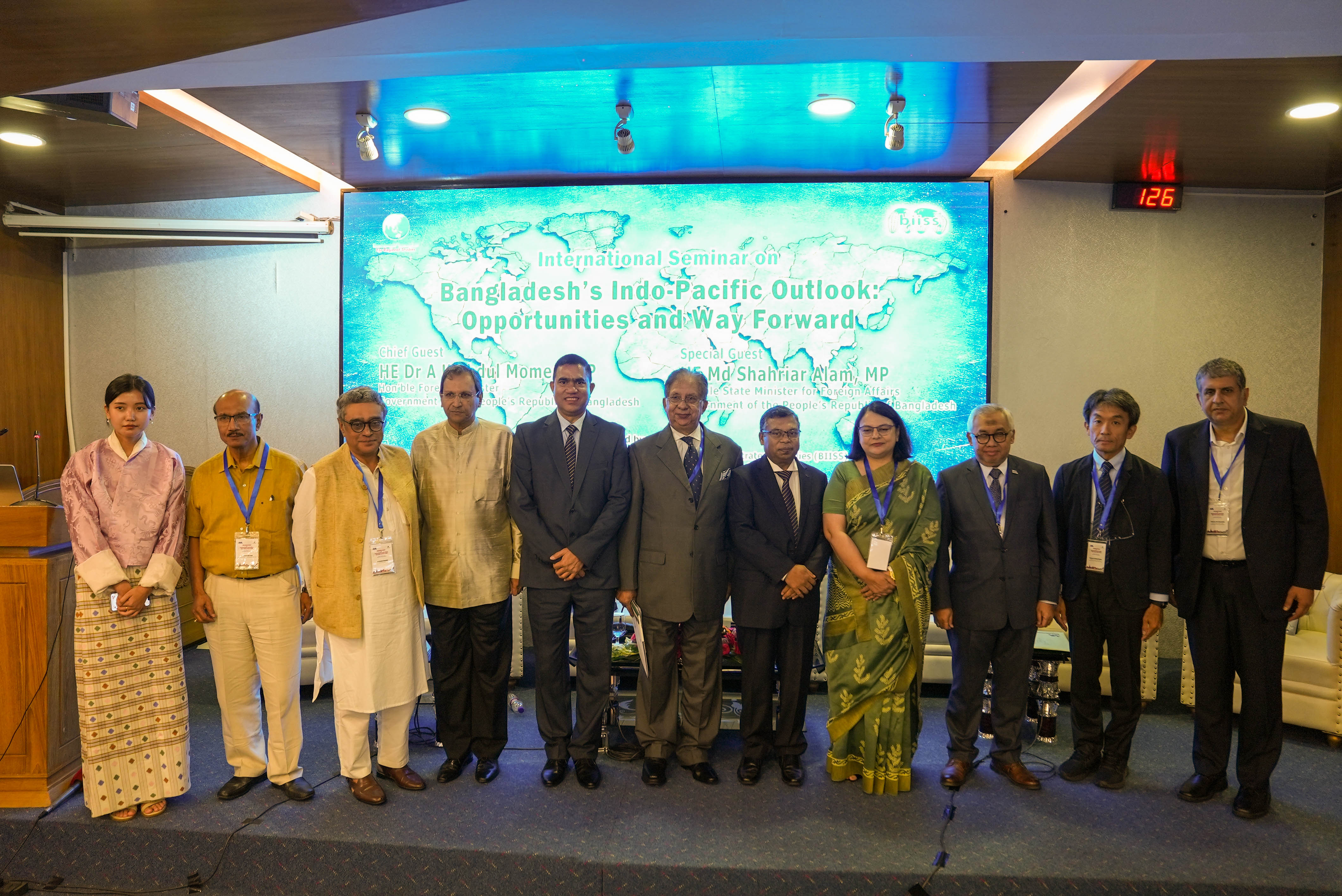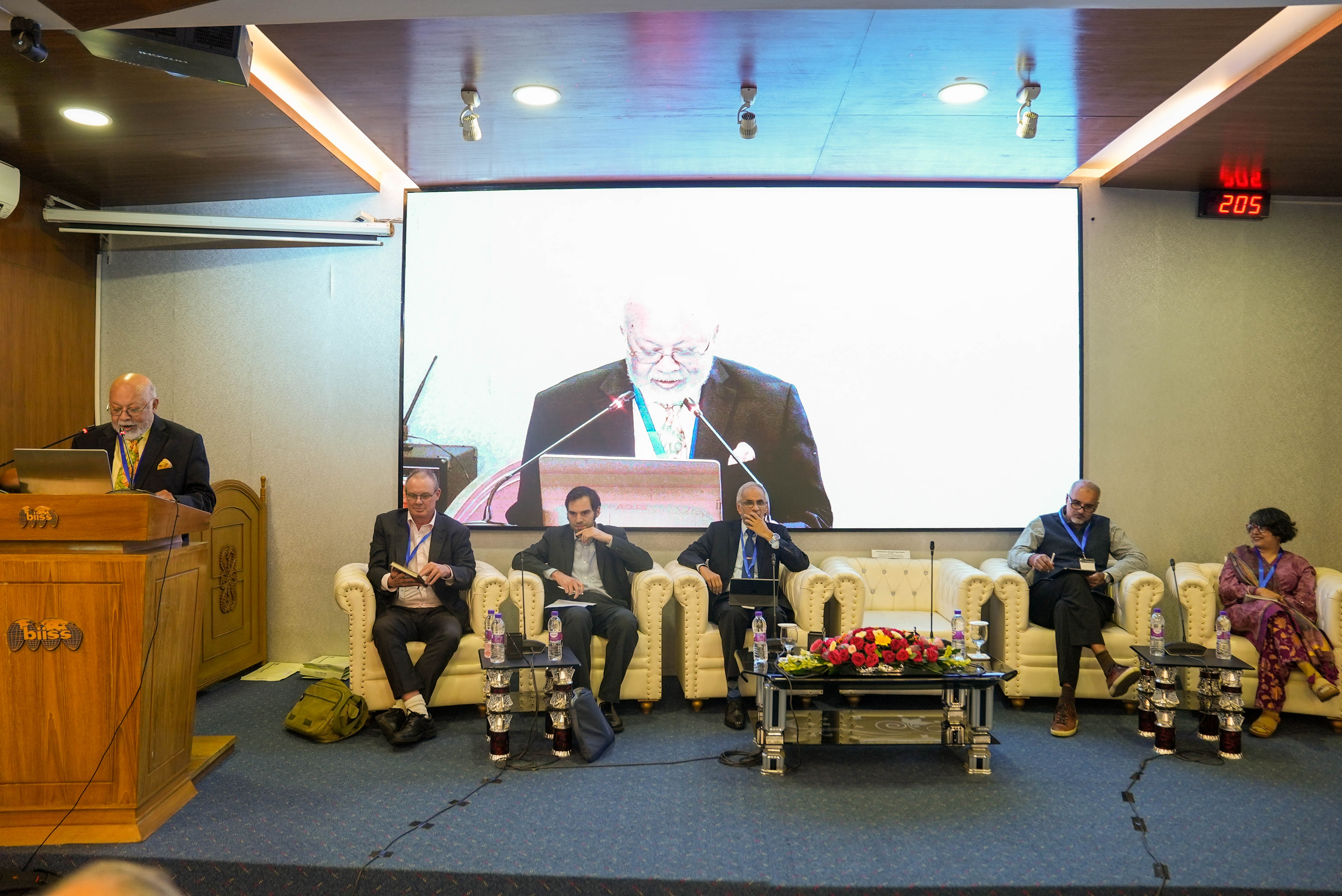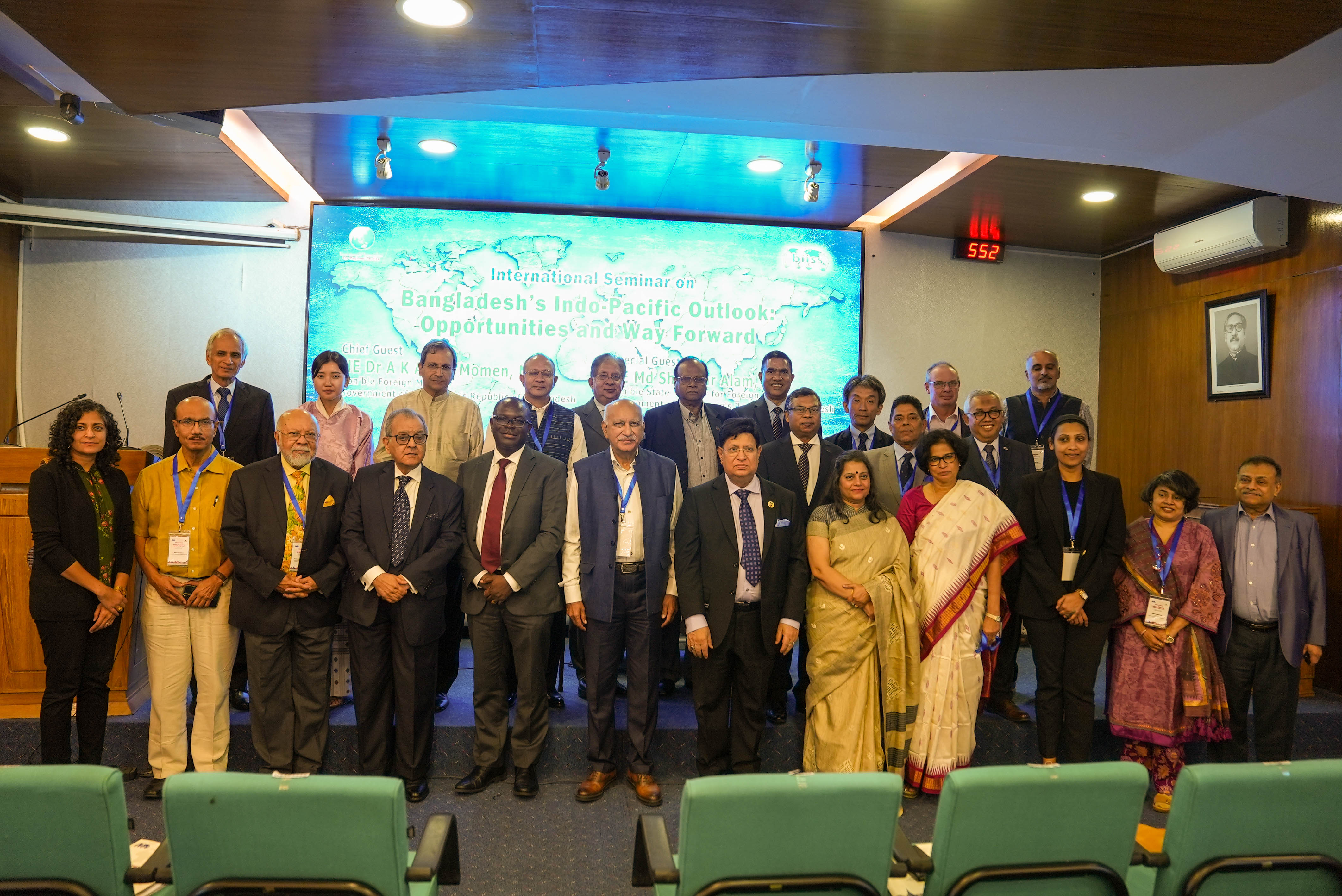International Seminar on Bangladesh’s Indo-Pacific Outlook: Opportunities and Way Forward
DATE: 2023-09-02
Bangladesh Institute of International and Strategic Studies (BIISS) and Bangladesh Foundation for Regional Studies (BFRS) jointly organised an International Seminar on “Bangladesh’s Indo-Pacific Outlook: Opportunities and Way Forward” on 02 September 2023 at the BIISS auditorium. HE Dr AK Abdul Momen MP, Honourable Foreign Minister, Government of the People’s Republic of Bangladesh, graced the international seminar as the Chief Guest. HE Md Shahriar Alam MP, Honourable State Minister for Foreign Affairs, Government of the People’s Republic of Bangladesh, was present as the Special Guest. Ambassador AFM Gousal Azam Sarker, Chairman, BIISS Chaired the Inaugural Session and delivered the Welcome Address. Ambassador Masud Bin Momen, Foreign Secretary (Senior Secretary), Government of the People’s Republic of Bangladesh, presented the Keynote Address. Director General of BIISS Major General Sheikh Pasha Habib Uddin, OSP, SGP, BAMS, afwc, psc Chaired the Closing Session. The Introductory Remark was delivered by Mr ASM Shamsul Arefin, Chairman, BFRS. The Keynote Address was delivered by Ambassador Masud Bin Momen, Foreign Secretary (Senior Secretary), Government of the People’s Republic of Bangladesh. Ambassador Pankaj Saran, Convener, Centre for Research on Strategic and Security Issues, New Delhi also delivered his remarks in the Inaugural Session and Mr M J Akbar, Former Minister of State for External Affairs of India delivered his remarks in the Closing Session.
There were four sessions in the international seminar including the Inaugural and Closing Session. The first working session titled “Prosperity and Resilience” was moderated by Ambassador Shamsher Mobin Chowdhury, BB, President, Association of Former Ambassadors and the second working session titled “Inclusive Security for Growth and Development” was moderated by Ambassador Ahmad Tariq Karim, Director Center for Bay of Bengal Studies, Independent University, Bangladesh. Distinguished panelists of the working sessions were HE Salman Al Farisi, Secretary General, Indian Ocean Rim Association (IORA), Professor Dr Hideaki Shinoda, Graduate School of Global Studies Tokyo University of Foreign Studies, Tokyo, Professor Surat Horachaikul, Director, Indian Studies Center Chulalongkorn University, Bangkok, Ambassador Ravinatha P Aryasinha, Executive Director, Lakshman Kadirgamar Institute, Colombo, Barrister Nihad Kabir, President, Business Initiative Leading Development (BUILD), Admiral Karambir Singh, PVSM, AVSM, IN (Retd), Chairman, National Maritime Foundation, India, Dr Iqbal Singh Sevea, Director, Institute of South Asian Studies, National University of Singapore, Mr Michael Kugelman, Director, South Asia Institute Wilson Center,Washington, DC, Dr David Brewster, Senior Research Fellow, National Security College Crawford School of Public Policy, Australian National University, Canberra, and Professor Dr Lailufar Yasmin, Chairperson, Department of International Relations University of Dhaka.
Ambassador AFM Gousal Azam Sarker, Chairman, BIISS mentioned that Bangladesh’s geographic position, being a key littoral of the Bay of Bengal, bears great significance in the Indo-Pacific region. It is considered the gateway to South and Southeast Asia, making itself a hub for regional and interregional trade and commercial activities. Besides, it has become a pioneer of global peace and a role model for growth in the Asian region. He also added that as the Indo-Pacific is on its way to becoming a critical ground for collaboration and competition, it has gained enormous geostrategic, economic and geopolitical significance.
Major General Sheikh Pasha Habib Uddin, OSP, SGP, BAMS, afwc, psc Director General, BIISS, noted that although Indo-Pacific presents an abundance of prospects, it also offers certain challenges. To overcome such challenges, first, it is important to build a community of likeminded states to have a common approach. Then, strong engagement in multilateral dialogues is important to address challenges in climate change, security threats, and economic inequalities. Enhancing economic ties, in this regard, can also serve as a tool for maintaining regional stability and preventing rivalry or conflict.
Mr ASM Shamsul Arefin, Chairman, BFRS noted that the Indo-Pacific region has gained tremendous geo-strategic and geo-economic momenta in the last few years. Being located at the heart of the Bay of Bengal, there is no scope for Bangladesh to sit aside, rather it recognises the importance of understanding and engaging with the evolving dynamics of the Indo-Pacific to utilise the untapped potentials and greater interests. Bangladesh envisions a free, open, peaceful, secure, and inclusive Indo-Pacific for the shared prosperity for all and to realise her vision of being a modern, knowledge-based developed country by 2041.
Ambassador Masud Bin Momen, Foreign Secretary (Senior Secretary), Government of the People’s Republic of Bangladesh while presenting the Keynote Address mentioned that since its launch in April, Bangladesh’s Indo-Pacific Outlook (IPO) has generated considerable interest at home and abroad. It reinforced the conviction that this had indeed been the right move to make. It was critical for Bangladesh to articulate its approach to the Indo-Pacific in a concise manner in order to minimise the scope for unwarranted confusion or speculation. The country’s IPO has so far elicited a positive response from all our major international partners for its thrust on “shared prosperity for all”.
HE Md Shahriar Alam MP, Honourable State Minister for Foreign Affairs, Government of the People’s Republic of Bangladesh noted that the current government believes in strengthening regional connectivity via quality infrastructure, people-to-people exchanges and institutional harmonisation. Bangladesh wants to be assured of peace, prosperity, and stability in the region by focusing efforts on capacity building as well as humanitarian and disaster relief operations. Bangladesh’s Indo-Pacific outlook focuses on multilateralism and the centrality of the blue sphere. The country wants to establish broader and deeper ties with major powers and other regional countries as today’s security challenges are more directly related to cross-regional and global issues such as the prevention of the spread of international terrorism as well as maritime security.
Chief Guest of the International Seminar H E Dr AK Abdul Momen MP, Honourable Foreign Minister, Government of the People’s Republic of Bangladesh, noted that constructive regional and international cooperation is one of the guiding principles of the country’s ‘Indo-Pacific Outlook’. He expressed his firm belief that economic development and prosperity are directly linked with regional connectivity. Bangladesh has always taken proactive measures in regional and sub-regional connectivity in South Asia. It is also an active participant in IORA and ARF. Through these, Bangladesh has worked as a bridge between South and Southeast Asia. Now Bangladesh is ready to expand its engagement with more members of the Indo-Pacific region.
There were three open sessions in the International Seminar. Senior officials from different ministries, ambassadors and high commissioners, senior civil and military officials, media, academia, think tanks, business personalities, students and teachers from different universities as well as international participants participated in open discussion sessions of the international seminar. The international participants were Professor Sujit Dutta, Distinguished Fellow, Vivekananda International Foundation, New Delhi, Dr Smruti S Pattanaik, Research Fellow, Manohar Parrikar Institute for Defence Studies and Analyses, New Delhi, Dr Sreeradha Datta, Professor, Jindal School of International Affairs, O.P Jindal Global University, Dr C Raja Mohan, Senior Fellow, Asia Society Policy Institute, New Delhi, Admiral Karambir Singh, PVSM, AVSM, IN (Retd), Chairman, National Maritime Foundation, New Delhi, Dr Swapan Dasgupta, Ms. Preeti Gaonkar, Director for Operations, Asia-Europe Foundation, Singapore, Mr Hemanta Kharel, Chairman, Nepal Council of World Affairs, Kathmandu, Nepal, Dr Rameez Abbas, Associate Professor, College of International Security Affairs (CISA), National Defense University, Washington, DC, and Ms Pema Tshoki, Researcher, Centre for Bhutan & GNH Studies (CBS), Thimphu.


